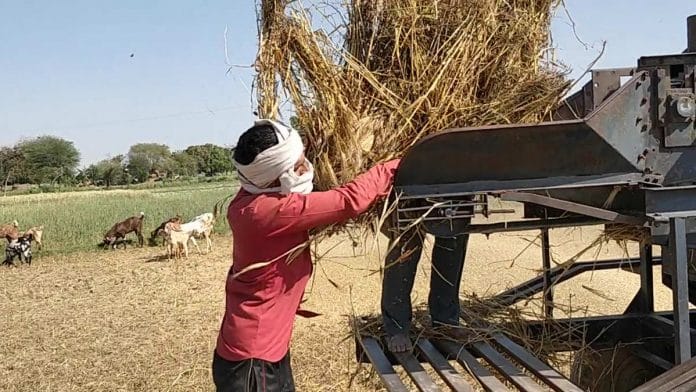New Delhi: The Narendra Modi government Wednesday approved amendments to the Essential Commodities Act and brought an ordinance that will allow farmers to sell their crop to anyone, a move that is expected to go a long way in helping Indian farmers and transforming the agriculture sector.
The decisions are part of the Modi government’s Rs 20 lakh crore lockdown relief package, which was announced in multiple parts last month.
The changes to the Essential Commodities Act, 1955, will “deregulate” various agricultural commodities like cereals, pulses, oilseeds, edible oils, onion and potatoes from stock limits, except in case of natural calamities like famine.
“This will remove fears of private investors of excessive regulatory interference in their business operations,” a government statement said.
Stock limits are enforced by the government to check hoarding and price rise of essential commodities.
Briefing reporters, Agriculture Minister Narendra Singh Tomar said farmers need to get better prices for their produce even if there is a slight shortage.
While India has established surplus in most agri commodities, farmers have been unable to get better prices on account of a lack of investment in cold storage, warehouses, processing and export, the government said. It attributed the lack of investment to “dampened entrepreneurial spirit” because of the “hanging sword of Essential Commodities Act”.
“Farmers suffer huge losses when there are bumper harvests, especially of perishable commodities. With adequate processing facilities, much of this wastage can be reduced,” the government statement said.
The statement added that while liberalising the regulatory environment, the government has also ensured that interests of consumers are safeguarded.
“It has been provided in the amendment, that in situations such as war, famine, extraordinary price rise and natural calamity, such agricultural foodstuff can be regulated. However, the installed capacity of a value chain participant and the export demand of an exporter will remain exempted from such stock limit imposition so as to ensure that investments in agriculture are not discouraged,” the statement said.
Also Read: Agriculture sector to grow at 3% in 2020-21 despite Covid-19 lockdown: Modi govt
‘Freed from APMC monopoly’
In another landmark reform, the Union Cabinet approved the Farming Produce Trade and Commerce (Promotion and Facilitation) Ordinance, 2020, that will ensure barrier-free trade in agriculture produce.
Agriculture ministry officials said the ordinance will bring in much-awaited reform in the agriculture marketing sector as it will now provide freedom to farmers to sell their crop to anyone, unlike the erstwhile setup where they could only make sales to to licensed traders in the APMC (Agricultural Produce Market Committee) mandis near them.
However, the details of the ordinance are yet to be released, and it remains to be seen how it translates on the ground with respect to stakeholders like farmers, retail and wholesale traders, and food processing companies.
Indian farmers have thus far been forced to sell their produce to traders registered by state governments, at notified APMC markets, the government said in its press statement. Further, it added, barriers exist in the free flow of agriculture produce between several states owing to APMC legislations enacted by their governments.
“The ordinance will create an ecosystem where the farmers and traders will enjoy freedom of choice of sale and purchase of agri produce. It will also promote barrier-free inter-state and intra-state trade and commerce outside the physical premises of markets notified under State Agricultural Produce Marketing legislations,” the government release said.
While mandis and state APMC Acts will remain, Tomar stated, the ordinance will provide farmers more opportunities and freedom to sell their produce to whoever they want, without fearing the inspector raj.
The ordinance basically aims at creating additional trading opportunities outside the APMC markets to help farmers get remunerative prices due to additional competition. This will supplement the existing MSP procurement system, which is aimed at providing a stable income to farmers.
Also Read: First lockdown, now Amphan — Paddy, betel farmers in West Bengal and Odisha are devastated
‘States should bring more reforms’
Farm sector experts have, however, called for more reforms by state governments to ensure further liberalisation of agricultural trade as it will facilitate better price realisation for farmers.
Also, providing multiple purchasing options for farmers will mitigate risks in the event of price crashes during bumper harvests, but this, too, depends on strengthening of agri supply chain infrastructure, such as cold chain and transport, by both the central and state governments, they said.
“State governments should also abolish their APMC Act to bring uniformity and clarity in agricultural markets across the country for farmers to get a better price for their produce,” Arabinda Kumar Padhee, director, country relations and business affairs, at the Hyderabad-based International Crops Research Institute for the Semi-Arid Tropics (ICRISAT), told ThePrint.
“However, if farmers are allowed to sell outside the mandis, they need to be provided market intelligence so that they can sell their crops at appropriate locations at the right time,” added Padhee, saying the nationwide E-NAM (National Agriculture Market), the nationwide e-trading portal, needs to be upgraded to keep farmers updated about the prices of commodities at various locations.
However, Ajeet Kesari, principal secretary in the Madhya Pradesh farmer welfare and agricultural development department, said there “is no need for states to amend the state APMC Act”.
“Under the Madhya Pradesh Mandi Act, only traders need to get a licence for a particular mandi and procure agricultural produce there, whereas the farmer is free to sell their crop wherever they want.”
Kesari said many cotton farmers in the state sell their crop produce in neighbouring Maharashtra. “Most of the cotton gin industry is in Maharashtra, which gives better and competitive prices for their produce,” added Kesari.
Also Read: Why India’s rural economy stands to gain after the lockdown is lifted






